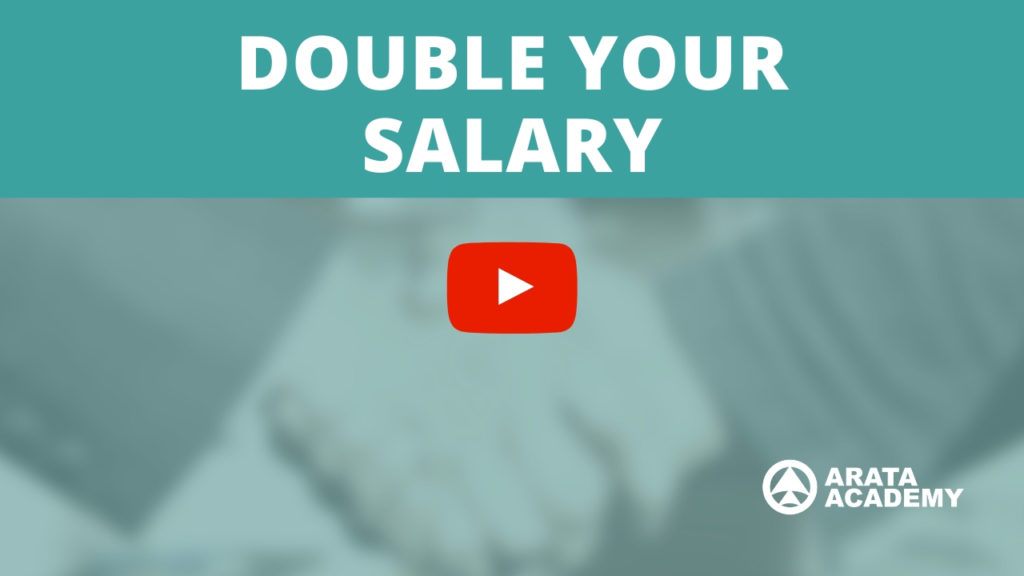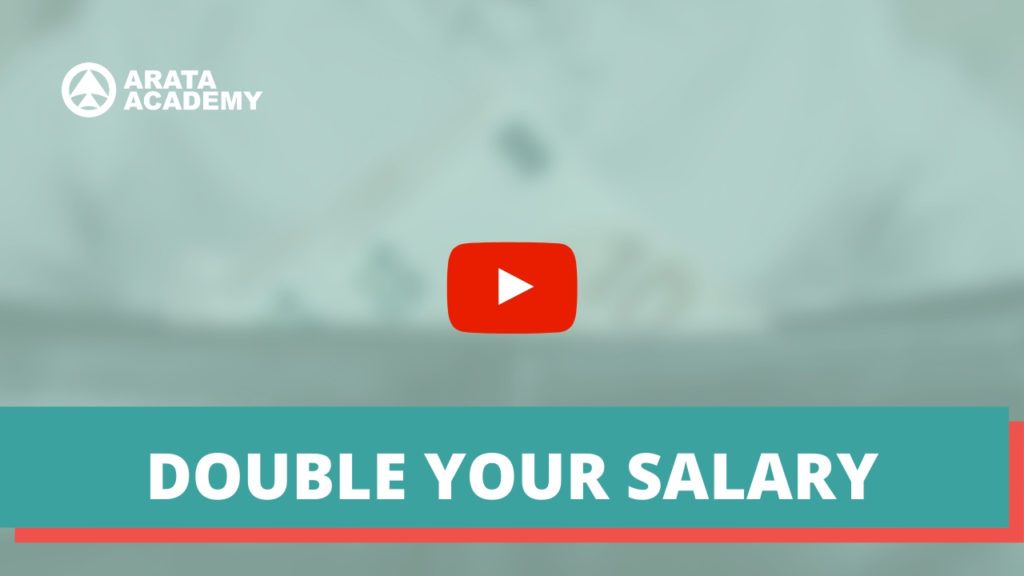Hello! Seiiti Arata. Picture the following situation. Two employees from the same company decide to ask their boss for a pay raise. Both of them have more or less the same strengths and weaknesses. Except one of them is about to make that request without any preparation. He doesn’t prepare for the conversation because he believes he deserves to earn more and that it’s already obvious to everyone. The other employee behaves differently and, before asking for a raise, he prepares by studying different negotiation techniques.
Who do you think has a better chance of getting that pay raise? Obviously, the person who prepares will get better results.
Once you master negotiation techniques, you’ll be at a huge advantage when it comes to getting pay raises or promotions at work.
I’d say that 99,99% (ninety-nine point ninety-nine per cent) of the population doesn’t know how to negotiate properly. And the reason behind that number is that most people simply don’t know how to negotiate and aren’t interested in learning negotiation techniques. So, congratulations on being different and wanting to learn about negotiating in this conversation.
When we talk about negotiation, we’re talking about every type of communication in which different people want to reach an agreement. That’s why there are so many different types of negotiation: for sales, for international agreements, and even for marriage or when it comes to picking a restaurant to eat out. But our conversation today will focus specifically on techniques to negotiate a pay raise, ok?
And the first step to getting that raise is a tip on what not to do.
Don’t negotiate your position when trying for a raise.
When we talk about negotiation, one of the big mistakes you can make is to think that you always have to start out from a high position so that the other part can start low until you reach a middle ground.
I’ll give you an example to illustrate that mistake. Let’s say you’re looking for a 30% (thirty per cent) pay raise. It’s a mistake to open negotiations with your supervisors by asking for a figure well above that, asking them to triple your current wage.
Your boss will get that your request is beyond reason and that it’s time for him to offer a much lower figure, for instance a 15% (fifteen per cent) raise. Then, you make a concession and say you’ll settle for 50% (fifty per cent). In the end, your boss improves his offer to 30% (thirty per cent), which is what you wanted from the start.
Do you get the mistake in this example? The mistake is to think that we need to ask for much more than we really need to reach a happy medium.
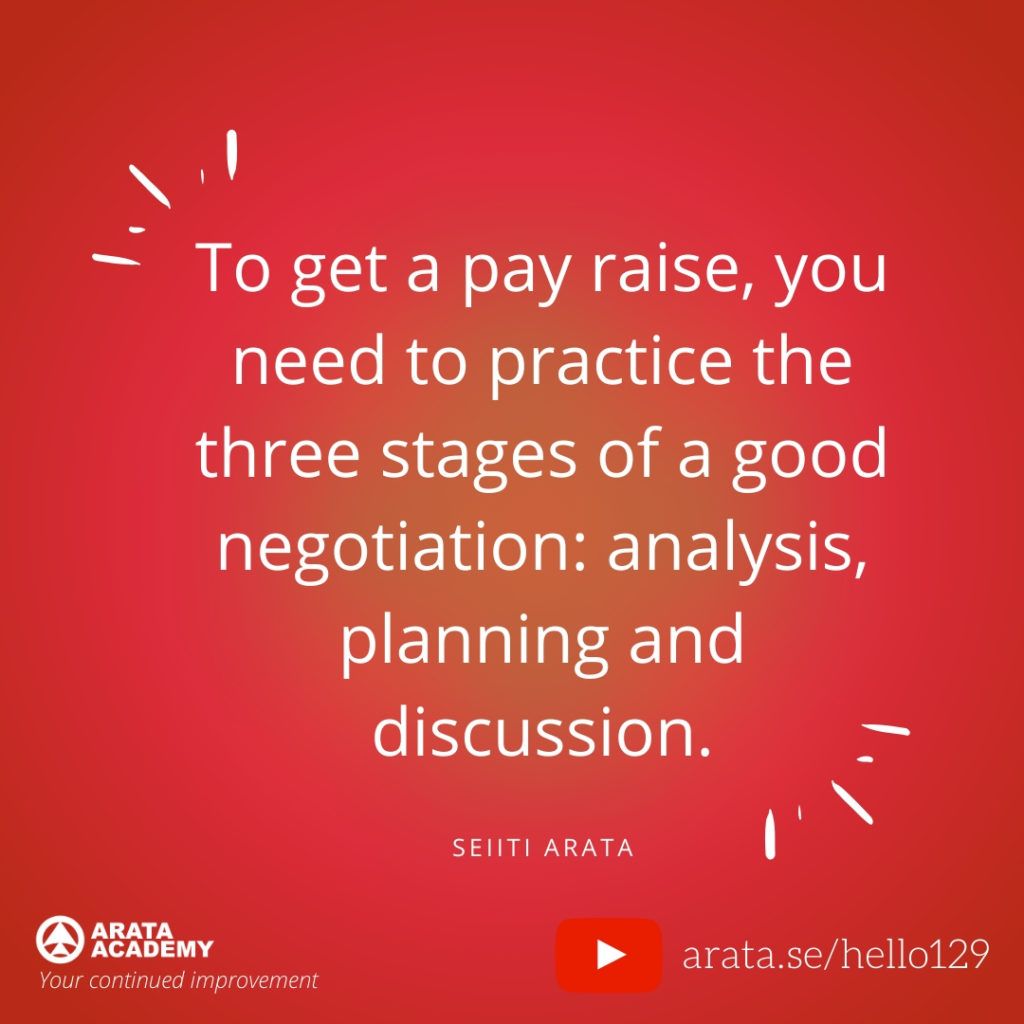
Apart from being a well-known cliché, this kind of thinking has another big flaw. When you open negotiations asking for an extreme figure and your boss counters with another extreme, both parties get tied to those positions.
And what’s the problem with sticking to a position? Well, it will make it hard to find creative solutions to get what you really want.
If you say you want to triple your current wage, you’ll have to explain that you developed such and such a project, that you hit such and such a target, that you’ve already undergone training to take on new challenges and grow the company…
And to justify his much lower offer, your boss will also have to make up a justification. And he might then have to stick to that made up justification. He’ll have to tell you that the company has a limited budget, that the country’s economy is not doing well, that if he gives you this raise it won’t be fair on the other employees…
The more these explanations go on, the harder it gets to negotiate anything at all. Both parties’ egos prevent them from backing down from their positions, because no one wants to lose. And that’s where the conversation can take a difficult turn.
In other words, the negotiation turns into a childish game of « let’s see who wins ». That’s everything you don’t want, especially when you’re negotiating with your boss, who is really in a position of power.
Now that doesn’t mean that you have to go for a gentle negotiation like « what if, one day… can we think about it? ». Because that way of communicating is neither objective nor assertive.
If you fail to be objective or assertive, you take the risk of not being taken seriously. Your supervisors might realise that they can keep putting off the conversation and keep you on the same wages for months on end.
Now that we’ve seen what you shouldn’t do, let’s unpack what you can do to get better at negotiating.
Take an interest-based approach when negotiating your wages.
Instead of making the mistake of negotiating positions, your best bet to get a pay raise is start negotiating based on interests.
This is another approach that will help you stay away from the difficult zone where people feel the need to protect their ego and defend their position. It’s a less tense and childish way of negotiating.
Interest-based negotiation is more mature and efficient because it doesn’t conflate our positions with our identities. That means you and your boss don’t need to defend your positions nail and tooth to prove you’re right or fight over who will win out in the end.
Interest-based negotiation also helps us to think about our true needs, and what really matters to us, which allows to bring more creativity to the process.
Let’s also make it clear that interest-based negotiation ends up being fairer to everyone involved, because it strives to meet everyone’s needs. Interest-based negotiation is an interaction whose dynamic is solution-oriented.
A negotiation based on positions has a dynamic focussed on winners and losers. And that’s a crucial distinction to make when we’re dealing with a boss who has the power to fire us at any moment.
There are three stages to an interest-based negotiation: analysis, planning and discussion.
In an interest-based negotiation, there are three important stages: analysis, planning and discussion. And it’s only at the discussion stage that the negotiation conversation takes place, face to face. Before that, you need to do some ground work and go through the analysis and planning stages.
This prep work of analysing and planning is crucial because usually, if you start speaking without listening, you’re unlikely to get the result you want. You need to be prepared. You need to know what you’re going to say. And to know what to say, you need to listen first, and collect strategic information.
This is a lesson that really needs to sink in, and when it does, it really sets us apart from the majority of people of who don’t know how to negotiate properly. In your negotiation process, it is crucial you set aside some time to understand precisely what your boss’s goals are, what he can give, what is completely off-bounds, what are his fears and wishes.
You need to know exactly what is going on on the other side so you can start saying exactly what is both relevant to your goals and what your boss will want to hear.
In our course Double Your Salary, I explain the three stages of interest-based negotiation in detail. You can find out more about it at https://arata.se/dys – The Double Your Salary course is an online training program which takes you through four main pillars to get your pay raise: environment, mindset, behaviour and communication.
I really want you to have the skills and the ability to negotiate your pay in a smart way and that’s why before I tell you more about the course, I think it’s really important to stress that distinction between interests and positions.

Positions and interests are different things.
Until now, you’ve learnt that we have to act differently to most people, and avoid negotiating based on positions. Position-based negotiations paralyse us and prevent us from getting good results. It’s crucial to be flexible, creative, and try out different approaches to get the results we want.
That’s why it’s better to think in terms of interests and not positions.
At the analysis and planning stages, we need to picture how the other party will react. Play out all the possible scenarios before they happen. This will help you prepare much better for any possibility that comes up.
A good way to do these mock negotiations is to foster good relationships at work. If you have a good relationship, that gives you great sources of information to picture the reactions of the person with whom you’re negotiating.
Another tip for this activity: imagine the kinds of proposals you want to make and then think them through as if you were the other party, asking yourself « why? » and « why not? ».
Write out the possible answers and list the pros and cons of what each part has to win or lose in each situation.
Ask intelligent questions to uncover the other party’s interests.
The best way to gauge your boss’s interests in a pay raise negotiation is to ask yourself intelligent questions before the conversation happens, and write out the answers. This process gives you a global vision of the different interests at stake and will allow you to negotiate more efficiently.
For instance:
– What will other people think of your boss when they find out he’s given you a raise?
– What will other people think of your boss when they find out he HASN’T given you a raise?
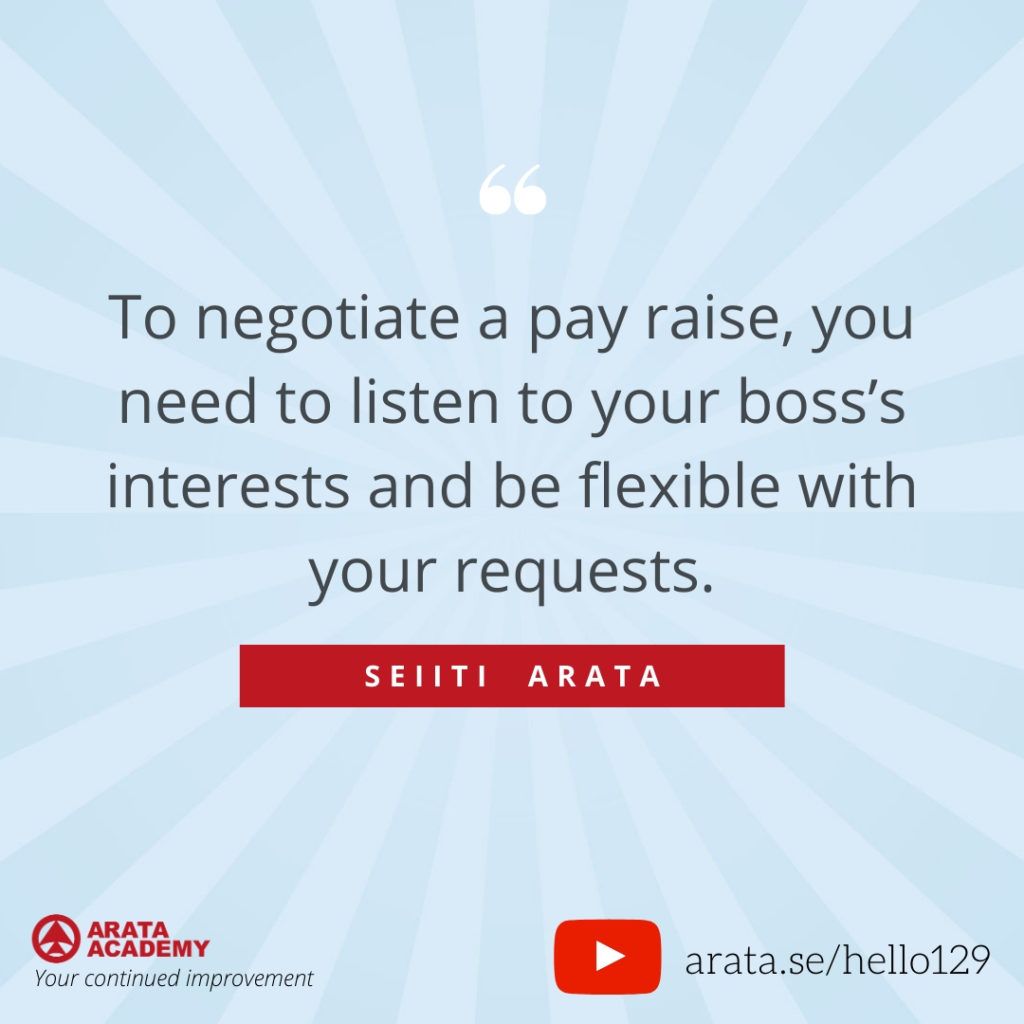
– What might happen if you get promoted? Could it create a dangerous precedent for your boss? Could it trigger a general feeling of « I want one too » among the other employees?
– What are the immediate consequences of being promoted? Of not being promoted?
– What are the long-term consequences of you getting that pay raise?
– What kind of gap are you leaving if you get promoted to a higher position?
As well as asking yourself smart questions, you also need to think strategically. In other words, think beyond the pay raise, go beyond the financial gain. Find everything you can ask for that will help you progress in your career.
Want an example? If you know there’s a department you can go to and learn lots of things in a growing area of the business, that might be better for you than staying in a quieter department that isn’t growing.
Before going into the negotiation itself, you need to understand that both you and the company have multiple goals and needs. Write all of them down to have a solid basis for your negotiation.
And make sure you are very clear about the points that are truly essential to you, and the points you can let go of, if needs be.
Be flexible about non-essential points. That will allow you to focus on what is really important and what you don’t want to sacrifice during the negotiation. If you ignore your non-negotiable needs, you risk leaving the negotiation with a bitter feeling and you probably won’t want to show the same enthusiasm for your work going forward.
Negotiating is not about winners or losers.
This concept of having a few points we can let go of and other non-negotiable points is very important. You need to have clarity to identify the things you can be flexible on. That clarity is necessary to avoid making the mistake of thinking that if you didn’t get absolutely everything you asked for, you failed in your negotiation.
That’s a limiting point of view and it’s very harmful. A good negotiation doesn’t have winners or losers. A good negotiation is when all parts leave with the feeling of having gained something important.
Going into a negotiation with an aggressive stance, ready for conflict like « it’s all or nothing » is inefficient. Behaving that way only hinders, it doesn’t help.
Instead of that, carry out a good analysis and plan to open with a reasonable request, which makes sense to you and your boss.
Another thing that gets in the way is the belief that there’s only one solution to the problem at hand.
For instance, there are people who go into negotiations with the mindset of « either I get this pay raise or I quit. » But is quitting really a viable alternative? Being out of work, having to look for a new job, having to leave your projects and colleagues behind?
That way of thinking is very limited. There is scope to be more creative and see smarter ways to get what you want. You can negotiate benefits, or agree on a bonus based on targets you’ve hit, or negotiate financial support for professional development courses, or flexible hours, or being allowed to collaborate with other teams, to be involved in projects that will help you grow…
If you start your negotiation in a friendly manner, you can ask your boss frank questions. If he tells you the best raise he can offer is 5% (five per cent), you can ask him what other perks he can offer. And let him think.
If, for instance, he offers to support you financially to go on a course, then, once that offer has been made, you can keep exploring that line of negotiation by telling him you want to keep learning more at work, too.
And ask in what new projects you can get involved, without stepping away from your current duties. That way, you’re already positioning yourself strategically for your next raise.
If you get successfully involved in new areas of the business, the company will definitely bear you in mind when new opportunities come up.
That’s what we need to do, always move forward as allies in search of common interests. What we don’t want to do is position ourselves as enemies, or opponents when we negotiate.
In other words, instead of thinking « give me a raise or I’m out. » try thinking in terms of «tell me what else I can do to help the company grow. Let’s grow together!»
Don’t make the negotiation personal.
When we ask for something and the other part says no, we tend to take that negative response personally. We might think that our boss doesn’t value our work, doesn’t like our personality or is just being unfair.
If you want to be a good negotiator, you need to be very careful about taking things personally.
The most important goal in the negotiation is to cater to the need to get the raise or promotion. Pointing out your boss’s character flaws, saying that he promised something only to go over on his word, saying your colleagues are being unfair, none of those things are part of that main goal.
If you attack your boss or insinuate any of those things during the conversation, what will happen? You’ll lose your focus. The conversation will stop being about negotiating your pay and will turn into a series of excuses because everybody you’ve attacked personally will want to protect their ego.
So, even if you’re right, never criticise the person, stay focused on the principles you want to promote.
In fact, when you get a random proposal like « ok, we can offer you a 4.5% (four point five per cent) raise. », ideally you should start by thanking them for their recognition. Then straight after you can ask them what criteria they used to get to that figure.
Never accept a random figure without asking about the criteria used, because once you’ve got the explanation you can usually boost that figure.
Let’s say your boss tells you that the 4.5% (four point five per cent) raise is due to the amount of time you’ve been with the company, inflation adjustment and promotion.
At that point you can argue something like « Thank you! I’ve run a couple of calculations and my wages have been the same for eighteen months. And in that period of time inflation has gone up by 4.5% (four and a half per cent). So for me to have a raise in real terms, taking into account my time with the company and the promotion, the figure would have to be higher than that. »
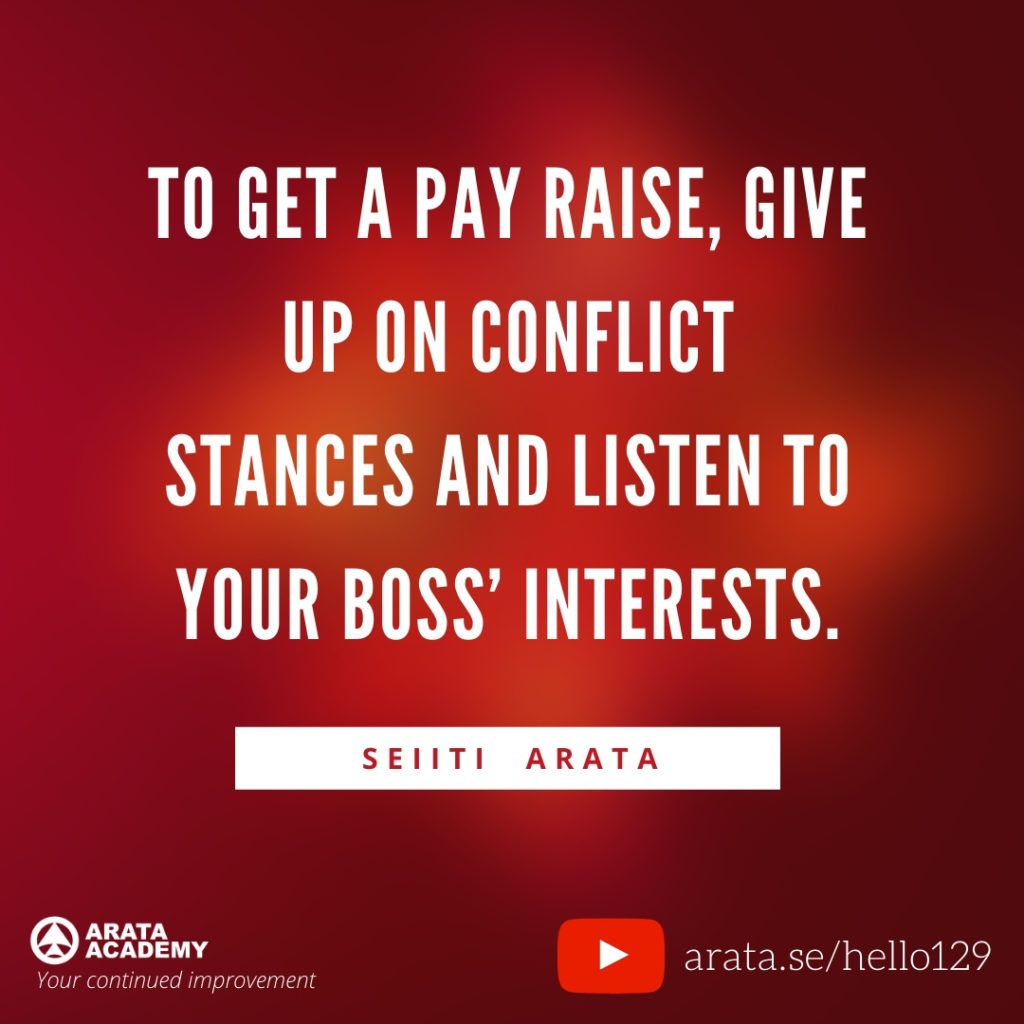
I think the lesson is clear here. If you don’t ask about the criteria, you’ll probably be offered less than what you could be earning.
Make your requests in a strategic order.
In the Double Your Salary course, you’ll get fully trained on how to make your requests in a strategic order to get the best possible outcome from your negotiation, as well as many other techniques.
For instance, first you need to pin down the items that can be negotiated before talking about figures at a later stage.
Imagine you’re going to ask for a raise based on your time in the company, inflation adjustment and promotion. In that case, you can’t let these different requests overlap.
Ideally, you want to always start strategically with the bigger requests. Ask if you can be promoted to a position with greater responsibilities, based on the quality of your work.
When your boss agrees to this, jump to the second point, and ask for a raise in light of the amount of time you’ve been with the company.
And so only at the end of the negotiation do you bring up something obvious like inflation, which is practically impossible to ignore or refuse.
Only after your boss has committed to negotiating those three items can you start talking about figures.
In this example, we’re only using three points of negotiation. But if you do your homework properly, you can negotiate far more than this.
Keep a positive stance.
The best way to stand out in anything is to act differently from most people. Your boss probably has to deal with lots of pay raise requests every month. And it’s very likely that everyone who comes in looking for a raise approaches it from a position of conflict, by making threats and complaints.
To avoid being just one more person in the crowd, you’ve got to enter the negotiation with a positive outlook, and expect the best kind of decision.
That doesn’t mean you’ll get your pay raise, but it will set you apart from the others. And even if you don’t get what you initially asked for, if you follow what you’ve learnt here you’ll be ready to make other proposals.
That’s what being prepared means. The majority of people don’t prepare and just show up from a position of conflict, make a demand and either leave frustrated or end up leaving their boss feeling frustrated.
Avoid being just one in a crowd. It’s your responsibility to show up with an interesting proposal for both sides and, if you can’t get the raise, you need to understands the reasons why and modify your proposal on the spot.
To stand out, you need to show your enthusiasm, your commitment, your desire to grow. Show the results you’ve already yielded, and mean to keep yielding if given the chance to be involved in bigger projects.
By doing this, your chances of getting a good pay raise and due recognition for your work increase exponentially.
Getting a pay raise isn’t easy, but it can be successfully achieved if you prepare and apply what you’ve just learnt.
Ideally, you should apply the tips you’ve learnt here after implementing the four pillars: Environment, Mindset, Behaviour, and Communication which I teach on the Double Your Salary course. Then you can carry out your Analysis and Planning, ok?
What we’ve talked about here is only the tip of the iceberg. For instance, I haven’t even told you about the BATNA (which stands for Best Alternative To a Negotiated Agreement). We still need to discuss what to do when your boss starts using techniques to single you out, or plays dirty. We need to cover how to deal with the psychological side of things, how to use the right body language, how to know if your boss is bluffing…
If you enjoyed these quick tips, I’d like to invite you to take the next step.The Double Your Salary course will show you how to put everything into practice, step by step, in detail, and you’ll be able to apply everything at work to get promoted in a positive way, by making allies at work and following common interests.
It doesn’t matter whether you’re working in a micro-company, a family business or a big multinational. You’ll learn principles that apply regardless of the company’s size. I guarantee you that if you do this training you’ll get your pay raise quickly, and you’ll also enjoy greater respect, recognition and security.
If you’re already a student on Double Your Salary, I’ve unlocked a special lesson about BATNA, the Best Alternative To a Negotiated Agreement. This bonus content is just for students.
Login to the students’ area to see the lesson. And if you don’t have access to the full course yet, take a look at https://arata.se/dys to sign up and get to know the Double Your Salary course. See you there!
